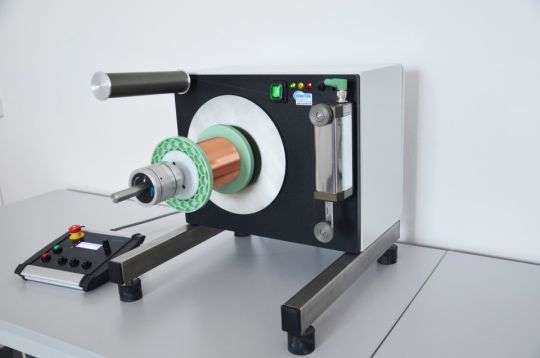
Table winding machines
Table winding machines are specialized equipment used for winding wire, thread, tape, or other materials onto a spool, bobbin, or core. These machines are typically mounted on a table or a flat surface, making them compact and easy to use in a variety of industrial and laboratory settings. Table winding machines are widely used in the production of coils for transformers, electric motors, inductors, and other electronic components where precise winding is required.
Features of Table Winding Machines
-
Compact Design: Table winding machines are designed to be compact, which makes them suitable for smaller production facilities, laboratories, and repair shops. Their size allows them to be easily placed on a workbench or table, providing flexibility in various working environments.
-
Precision Control: These machines are equipped with advanced controls that allow for precise adjustments to the winding tension, speed, and pattern. This precision is crucial for applications that require specific winding configurations to achieve desired electrical and mechanical properties.
-
Versatility: Table winding machines can handle a wide range of materials, including copper and aluminum wires, textile threads, and tapes. They can be used for different winding techniques, such as linear winding, cross winding, and layer winding, making them versatile for various applications.
-
User-Friendly Interface: Most table winding machines are designed with user-friendly interfaces that make it easy to set parameters, monitor the winding process, and make adjustments as needed. This ease of use is beneficial for operators, especially in settings where quick setups and changes are frequent.
-
Durability and Reliability: These machines are built to withstand continuous use and are made of robust materials to ensure longevity and reliable performance. This makes them suitable for both small-scale and large-scale production environments.
Applications of Table Winding Machines
-
Transformers: In transformer manufacturing, table winding machines are used to wind the primary and secondary coils with high precision to ensure efficient energy transfer and minimize electrical losses.
-
Electric Motors: The winding of stator and rotor coils in electric motors requires precision to achieve optimal performance. Table winding machines provide the control needed to create tight, evenly spaced windings that contribute to the motor’s efficiency and durability.
-
Inductors and Chokes: For inductors and chokes, precise winding is essential to achieve the correct inductance and minimize core losses. Table winding machines allow manufacturers to produce consistent and high-quality coils for use in electronic circuits.
-
Sensors and Actuators: Table winding machines are also used in the production of coils for sensors and actuators, where accurate winding patterns are critical for sensor accuracy and actuator performance.
-
Custom Coil Production: In research and development environments or for custom applications, table winding machines are often used to produce prototype coils or small production runs of specialized coils, providing flexibility in design and testing.
Advantages of Table Winding Machines
- Precision and Control: The ability to precisely control winding parameters ensures consistent coil quality and performance, which is essential for high-performance applications.
- Space Efficiency: Their compact size makes them ideal for environments with limited space, such as research labs or small production facilities.
- Cost-Effectiveness: Table winding machines provide a cost-effective solution for coil production, particularly for small to medium-sized batches.
- Flexibility: They can be quickly set up and reconfigured for different winding tasks, making them versatile for various winding requirements.

Table winding machines are a versatile and essential tool in the manufacturing of coils for a wide range of electrical and electronic applications. Their precision, compact design, and user-friendly features make them suitable for both industrial production and research settings. As a result, table winding machines play a critical role in ensuring the quality and performance of wound components in numerous applications.